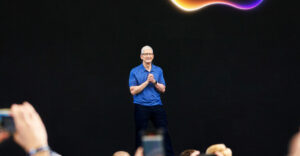
One of the interesting things about watching Apple’s rollout of the iPad and anticipating the rollout of its stunning generation 4 iPhone is that competitors don’t seem to get what makes Apple successful. As a result, they have generally failed miserably to bring forward offerings that have done as well.
I spent a lot of my life as a competitive analyst and still do some work along those lines today, so this week I’ll offer some suggestions about how a firm might beat Apple.
I’ll close with my product of the week and, strangely enough, it is the iPad — but the WiFi iPad, because the 3G product sucks.
Competing With a Dominant Company
One of the thing companies tend not to do when they go after a dominant company is fully assess both the firm’s strengths and weaknesses and set a budget adequate to the task of matching the strengths, exploiting the weaknesses, and getting people who don’t want to change to move. This last portion is most commonly left out, and it often seems that engineering companies lack the required behavioral specialties to understand that content buyers are hard to move to superior products because they are content.
Apple showcased this during the 90s, when it arguably had a better solution for many, given the problems with Windows Vista. Yet it wasn’t until it rolled out marketing campaigns that specifically focused on making people unhappy with Windows that it started to move share. Even so, and after a number of years, it only got to a piddling 10 percent share. Granted it, was the most lucrative share in the segment, as Apple basically took over the premium side of the PC market, but Microsoft owned the market overall and still does.
Even with all of Apple’s capabilities and a massive budget — and we could talk about IBM against Microsoft, Netscape, Oracle, Sun — it wasn’t able to hit Microsoft that hard even when the company had screwed up. Microsoft seems positioned to take at least some of that share back relatively easily.
On the other hand, Apple brought out the iPod and iPhone, products in areas where Microsoft was not dominant, and it ended up owning or taking a leadershop spot in those segments. When it hit Microsoft where it was weak, it was massively successful, and just as this approach worked for Apple, it could also be used against it.
Apple’s Weaknesses
Apple actually has a number of pronounced weaknesses. On the flip side of its impressive ability to assure quality is a tendency to excessively control its environment, which tends to alienate developers, retailers, carriers (it seems to be stuck with AT&T) and other partners.
This means it has to do most of its own heavy lifting in terms of marketing, whereas other firms are often more than willing to work with partners (which is why the first generation Zune, even though it sucked, got into so many retailers).
Apple has no connection into businesses and has a great deal of difficulty selling in volume. It likes to maintain margins and resist aggregated buying like the plague, which means volume buyers generally try to avoid Apple products. This has hurt the company in enterprise, education and government markets where users generally have to go through a lot of personal effort to overcome institutional objections.
Apple has limited lines, and it plays this to its advantage, but all people are not created equal, and consumers often like to have products that represent their unique needs — not the vendor’s view of a generic customer. A broad line that enveloped Apple’s could potentially be more successful, but only if it came close to matching Apple’s perceived product benefits.
Apple’s products are expensive, often costing upwards of 20 percent more than comparable offerings. This is the reason Apple can fund marketing programs that exceed others and still have the highest margins. However, buyers tend to favor bargains, and the world is not made up of folks who buy luxury products exclusively. Price is a sustaining weakness.
Going Where Apple Isn’t
Someone could address each of these weaknesses, and arguably the Verizon Droid does, and still not do that much damage to the company. This is because buyers currently except Apple to be the gold standard and are relatively happy, and often outspoken, about how much they like its products.
Apple also has impressive control of even those instances when people are critical. Jon Stewart, for example, recently pounded on Apple for use of excessive force and is known for not backing down in the face of governments, but in his Apple commentary felt the need to grovel to the firm at the end and praise its products.
Ellen DeGeneres, who admittedly doesn’t have the same reputation, pointed out faults in the iPhone in a parody and then had to publicly apologize to the firm even though she actually did nothing wrong — it was humor after all. Opera has that kind of power; I’m not aware of another company that does.
This showcases that you are unlikely to be able to beat Apple by being a better Apple. Like the strategy Apple used against Microsoft, you can’t win by emulating them and trying to be better, you have to go where they aren’t and hit them where they are weak.
Much like Apple took the smartphone in a direction that most didn’t anticipate, a competitor knowing that the iPhone and iPad are more at the beginning of an evolution and not the end of it, could move to where the products are going.
For instance, the two don’t yet work together and are highly redundant, resulting in duplicate expensive data plans and no obvious benefit to having both products. An offering that provided a better phone experience than the iPhone does (it’s great at everything but being a basic phone) that was both tethered and bundled with a tablet might be different enough, particularly if offered through Verizon, to flank Apple.
However, to beat Apple you can’t go where it is strongest, you have to hit where it’s weak, and the effort has to be budgeted to both create a complete and compelling offering AND get people to move to it. Anything less won’t be successful.
Product of the Week: The iPad That Doesn’t Suck

I was at the Intel event where it launched its new high performance Atom processor for smartphones last week and, ironically, a number of my peers were using iPads instead of notebooks. It actually is one of my laptop trends for 2010.
By the way, avoid the dock and go with the wireless keyboard. The folks doing this say it is vastly better with the iPad in landscape then portrait (even though the iPad jacket that makes this work is of surprisingly poor quality — you may want to use one of these instead).





















































Mr. Enderle,
I’m sure you’re a very nice guy…and I LOVE TechNewsWorld, (so much that I go through extraordinary pains to read the articles on a tiny phone screen, for which their CSS is NOT optimized).
But, I have to tell you…SOMEONE has to tell you…I don’t know how you got your job as a tech reviewer because clearly you haven’t any real idea what you’re talking about.
You state your credentials as a competitive analyst, I hope that’s not your day job.
While you are correct about Apple having a number of weaknesses, perhaps it was simply an over-sight not to mention that they are the same crappy, non-innovative, company that they’ve always been.
Apple doesn’t engineer products, it Un-engineers products. By simply taking whatever is currently accepted engineering best-practice or opperation and "doing it differently" usually at the expense of good engineering and ergonomics.
Their latest "great idea" being to smear the users skin oils all over the screen they’re trying to read and at the same time remove any tactile feedback.
It then takes it’s disgusting creation and sells insecure people an identity other than their own pitiful selves.
So than, WHERE is your strategy for combat against this in your article?
You have lost site that the reason Apple sells is because Apple provides it’s customers a new identity and not a better mouse-trap.
Don’t fret, you’re safe, even Bill Gates doesn’t "get it".